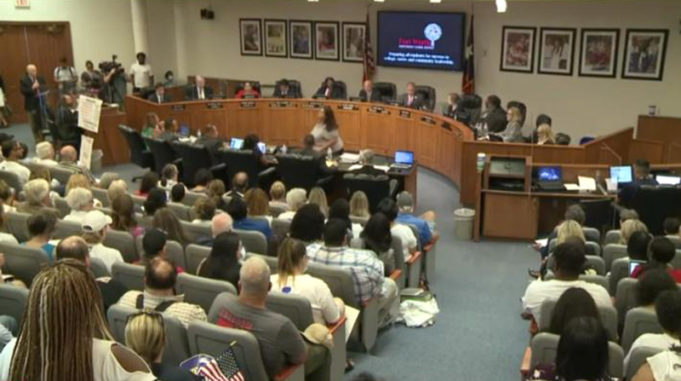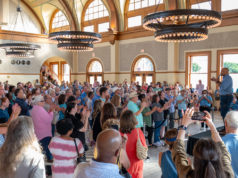Lifelong educator Shawn Lassiter has seen how systemic barriers to education can be broken if a concerted effort is made by teachers and professors.
“I remember girls not having access to STEM programs,” Lassiter said, referring to science, technology, engineering, and math courses that lead to careers in medicine, engineering, and other science-related fields. “We as a society doubled down on solving that. We named the culprit,” which was unequal learning opportunities for boys and girls.
Having an open and honest discussion about gender stereotypes helped change the prevailing narrative around which careers young women could explore, she continued.
“We have to do the same thing with race,” Lassiter said. “The difference is that the topic of race is more explosive.”
After several years of work as a Fort Worth school district administrator, Lassiter was hired by Leadership ISD in 2019 as the nonprofit’s Chief of Equity and Innovation. The nonprofit that trains school leaders on effective equity practices has worked with several current Fort Worth school board members, she said.
The past two Fort Worth school board meetings have shown how explosive racial equity policies can be, especially when they are misrepresented to the public (“ Misinformation Machine Ramping Up?” June 30). During meeting time allotted to public comments, parents have recently blasted Critical Race Theory (CRT), the academic framework that scholars use to understand how our country’s history of slavery and institutionalized racism shapes our current society and government institutions. Critics of CRT have falsely stated at local school board meetings that the theory is designed to make white children feel guilty for the actions of past white supremacists. CRT is not taught in public schools, and the misinformation has clouded the actual equity work that Fort Worth school district has committed to for the past several years.
In 2016, school board leadership created the Racial Equity Committee to examine the district’s practices and policies and to offer suggestions for improvement. The committee’s recommendations have led to the banning of suspensions for children in kindergarten through third grade and the creation of elective African American and Latinx history courses in high school.
Last year, the school district’s board of trustees unanimously passed a resolution that stated that the school district “has the power and the duty to be part of the solution to dismantle institutional racism on behalf of the children we serve and the community in which we all live.”
The resolution’s passage was “huge,” Lassiter said.
Lassiter said the vocal attempts to mischaracterize the school district’s equity work didn’t surprise her.
“We have been preparing for this type of backlash for a long time,” she said. “If anything, Texas loves to lead the way in stuff like this. We are continuing to build our coalition. We continue to do our work. We are in it for the long haul. I don’t know if the other group is. I think that the [uproar over CRT] will fade away, but it will shape up in another way. It’s about racism. It’s about separating people. It’s about not wanting to tell the truth about history.”
The school board racial equity resolution, the work of the Racial Equity Committee, and the training provided by Leadership ISD are focused on reframing how teachers and administrators think and work. Black and brown students see the fruits of that work through disciplinary policies that no longer target minorities and through elective high school courses that teach students about the positive societal contributions made by persons of color, she said.
“As a Black woman who was a Black girl, I understand the importance of learning about the Buffalo Soldiers,” she said, referring to the Black men who volunteered to patrol the Western frontier after the Civil War. “I carried that story as a motivator that my people contributed to this society.”
Fort Worth school board member Roxanne Martinez said that racial equity training for teachers and administrators is an important tool for helping students succeed academically.
“One of the things that I heard throughout my campaign was that everyone wants to see students succeed,” Martinez said. “However you feel about the Racial Equity Committee and resolution, that is one of the ways that the district is doing so. The racial equity resolution and committee were designed to eliminate the barriers in the systems and policies that are hindering student success and perpetuating racism in our schools and in our community. For those who really want to see students achieve, they have to look at how racial equity plays into our school district and our policies.”
From Lassiter’s perspective as a former schoolteacher and administrator and current nonprofit director, she said that racial equity work in public schools comes down to naming the culprit that holds back Black and brown students, who together make up the vast majority of the Fort Worth school district’s 83,000 students.
“It is about naming the barrier that has not been allowing Black and brown students to achieve at the same level of their white counterparts,” Lassiter said. “We have to think about how systemic racism and denial of resources has played in that. We know that when students have qualified and amazing teachers that look like them, they do better. Their scores go up. When students have resources and supplies, they do better. When kids eat well, those kids do better.”
When asked if the public comments from a vocal contingent of parents were part of a larger backlash against equity training in Fort Worth schools, Lassiter was undaunted.
“I don’t see that,” she said. “We’ve been doing this for over eight years. You would imagine that the backlash would have happened with teachers being trained and school boards having an hour-long conversation about race. If they were paying attention, they would have shown up then. We know it’s a part of a larger political scheme. We have to continue to refocus the people and board on the work that they do and not to get caught up in this distraction.”
The work of the school board and Racial Equity Committee can be directly tied to student achievements that include scholarships and college-bound students of color, Lassiter continued.
“These students are achieving scholarships and going to college in a way that is sustainable because they know who they are,” Lassiter said. “They won’t be shaken by a society that tells them they don’t belong. They know they belong, and they learned that right here in Fort Worth, Texas.”
I reached out to the school district for comment on the recent contentious school board meetings. When asked if the district is reconsidering its focus on racial equity training, a spokesperson said that the school district “continues to provide opportunities for district staff to engage in discourse around racial equity.”













You say “Critical Race Theory (CRT), the academic framework that scholars use to understand how our country’s history of slavery and institutionalized racism shapes our current society and government institutions” . . . . “is not taught in public schools.”
First, the writer has no way to discern what is, and is not, being taught in thousands of public schools. Second, if CRT is a legitimate “academic framework for scholars,” why would it NOT be taught in public schools, where scholars are found?
Scholars work at universities, not public schools. School district directors have been clear about what is and isn’t taught in their classrooms.